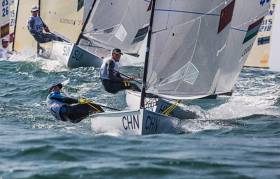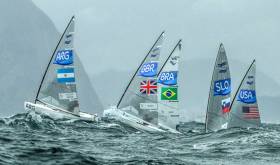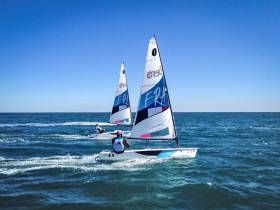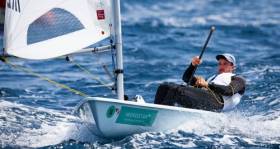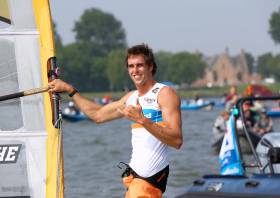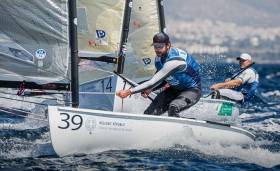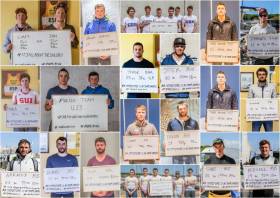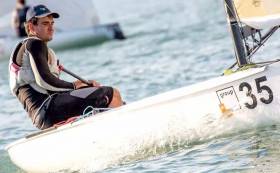Displaying items by tag: World Sailing
Finn Class Makes Eight Submissions To World Sailing Conference To ‘Rebalance The Slate’ In Olympics
The Finn class has made eight submissions to the upcoming World Sailing annual conference in Bermuda in its efforts to ‘rebalance the slate’ of Olympic sailing.
This past summer the one-person dinghy class — which at least year’s conference was removed from the Paris 2024 Games onwards in favour of a mixed two-person keelboat event — suggested a number of ways in which sailing’s world governing body could close the gaps of opportunity for men over 85kg and lightweight women.
These include cutting the number of board events from three (which it says “is not representative of sailing as a sport globally”) to two, or replacing the mixed kite with the Finn. The class does not propose any conflict with the newly introduced mixed keelboat.
The proposals form the basis of the Finn class’ eight submissions, which are available on the World Sailing website and will be reviewed and discussed at the conference which begins this Saturday 26 October.
The Finn class has announced proposals to ‘rebalance the slate’ of Olympic sailing as it identifies a lack of opportunity for heavyweight men and lightweight women.
The mixed one-person dinghy class, which late last year was removed from the Games from 2024 onwards in favour of a two-person keelboat, says the decision now leaves men over 85kg with no chance of sailing at the Olympics.
But it also identified a gap for lightweight women whose opportunities have also been limited, it says.
The International Finn Association now says it is “working on a series of submissions for November to rebalance the Olympic events, providing options for both heavyweight men and lightweight women”.
It is being suggested that kiteboarding becomes a men’s event match by a windsurfing event for women, while the mixed two-person dinghy becomes a women’s event alongside a reintroduced one-person dinghy for heavyweight men.
“It will be a balanced slate that allows for the widest possible spread of participation across genders, weights and nations within the constraints laid down by the IOC,” the class says.
These proposals will form the substance of its submissions to World Sailing for the governing body’s November conference in Bermuda.
And the class is appealing for responses from interested parties to get involved at [email protected] “to help us build a better balanced and more representative slate of Olympic events for 2024”.
RS Sailing says it respects the World Sailing council vote to retain the Laser as the Men’s and Women’s One Person Dinghy event for the 2024 Olympic Games in Paris — while also hailing the RS Aero’s superior evaluation.
As reported yesterday on Afloat.ie, sailing’s world governing body voted in a secret ballot on the last day of its Mid-Year Meeting on Sunday 19 May to retain the Laser and Laser Radial.
This was despite the upstart RS Aero outscoring the incumbent — which faces a name change amid a dispute between the class association and its former leading manufacturer — by more than 10% in a detailed evaluation and sea trials conducted this past March.
Reflecting on the decision taken in London on Sunday, RS Sailing said it “would like to sincerely thank World Sailing for giving the RS Aero the opportunity to be part of the 2024 Equipment Selection for the Men’s and Women’s One Person Dinghy.
“We were impressed throughout the whole process by the Evaluation Team, World Sailing staff and the Equipment Committee who did a very professional and impressive job. We were extremely confident in the depth and thoroughness of the Evaluation Panel to conduct a fair and complete evaluation process.
“RS Sailing also sends a heartfelt thank you to all our followers and sailors, old and new, and have been completely overwhelmed by the global support for the RS Aero and RS Sailing. You’ve all genuinely been on this journey with us and it feels like we’ve made a whole load of new friends in the process.”
The UK company said it was “undeniable that the RS Aero has been proven superior in almost every aspect” and cited comments from Dina Kowalyshyn, chair of the World Sailing Equipment Committee, who noted the boat’s light hull and size (which “make it attractive and suitable for the youth pathway”), its “modern materials and modern production methods”, and the fact that it is “mass production ready”.
“We couldn’t be prouder of the RS Aero,” RS Sailing added. “We have known for a long time that it was an awesome boat to sail but it’s now proved itself irrefutably to the world that it is.”
The company said it understands there are issues beyond determining what is the best performing equipment when it comes to the selection process.
“When the world is so heavily invested in legacy equipment it’s hard to move on from it,” it said, adding that it will continue to encourage World Sailing council members and member associations “who are eager for change from heavier, 50-year-old design equipment”.
RS Sailing continued: “We still believe that these decisions are not just about the Olympians; this universal sector drives the youth pathways and the opportunity to build women’s participation as well.
“The sport is currently in decline in many regions and we all share the primary responsibility to reverse that trend by proactively working with sailors and MNAs using the most modern equipment to present sailing to the widest possible audience in a collaborative and sustainable way.”
World Sailing’s Council made key decisions on the Equipment to be used at the Paris 2024 Olympic Sailing Competition on Sunday 19 May as the Mid-Year Meeting concluded in London, Great Britain.
The Laser was selected as the Men’s and Women’s One Person Dinghy, the IKA Formula Kite as the Mixed Kiteboard and the 470 as the Mixed Two Person Dinghy.
A Board of Directors recommendation to select the RS:X as the Men’s and Women’s Windsurf Equipment was rejected meaning a new proposal will be required and the process on selecting the Equipment for the Mixed Two Person Offshore Keelboat was also confirmed.
Paris 2024 Equipment
Before Council made its decisions on the Paris 2024 Equipment, the Board of Directors updated Council on its current plans for the Olympic Classes Contract. This included the position on implementing World Sailing’s Olympic Equipment Strategy (FRAND) agreed by Council in November 2018. In order to provide certainty for MNAs, sailors and teams, the Board will engage in contractual discussions only until 1 August 2019. If by that time no agreement is reached, the Board will report to Council that no agreement has been concluded and Council will then have to select new Equipment for the relevant Event.
Ahead of the debate, 21 Council members voted in favour of all votes on the Olympic Equipment being held in secret with 20 against. As a result, every vote cast was secret.
Men’s and Women’s One Person Dinghy
The Laser was selected as the Paris 2024 Men’s and Women’s One Person Dinghy Equipment, subject to agreement of the Olympic Classes Contract for 2024, following a ballot vote.
Under Regulation 21.1.3 (e), the decision on selecting the Equipment has to be made before 31 December 2019. Council members voted on deferring the selection of the Equipment to the 2019 Annual Conference but this was rejected meaning a decision had to be made in London.
The next step was to vote on the Equipment Committee recommendation to select the RS Aero. Their recommendation was rejected.
The process moved to a ballot and Council members were able to vote on the four boats that were part of the process – the D-Zero, Laser, Melges 14 and RS Aero.
The Laser won in the first round of votes.
For the Men’s One Person Dinghy, 36 voted for the Laser and five voted for the RS Aero. The D-Zero and Melges 14 received zero votes and there was one abstention.
For the Women’s One Person Dinghy, 37 voted for the Laser and four voted for the RS Aero. The D-Zero and Melges 14 received zero votes and there was one abstention.
Men’s and Women’s Windsurfer
As the Men’s and Women’s Windsurfer Equipment is under a re-evaluation procedure, World Sailing’s Board of Directors have authority on making recommendations to World Sailing’s Council.
The Board of Directors recommendation was to select the RS:X as the Equipment. 19 Council members voted to accept the recommendation, 23 voted to reject and there were zero abstentions.
As a result, the recommendation was rejected.
The Board of Directors will now have to propose a new recommendation to the Council.
Mixed Kiteboard
The Equipment Committee recommended to Council that they should approve the IKA Formula Kite Class as the Equipment for the Mixed Kiteboard Event. Forty Council members voted to approve the recommendation subject to agreement of the Olympic Classes Contract for 2024. One member rejected and one abstained.
Mixed Two Person Dinghy
World Sailing’s Council approved the 470, subject to agreement of the Olympic Classes Contract for 2024, as the Equipment for the Mixed Two Person Dinghy following the recommendation from the Equipment Committee. 41 members voted in favour of the 470. One member was against the 470 and there were zero abstentions.
Mixed Two Person Offshore Keelboat
Submission M01-19, which proposed a way forward with the procedure for selecting the Equipment, was put forward by the Board of Directors in advance of the Mid-Year Meeting and was approved by Council. 39 members were in favour with two rejecting and zero abstentions.
The Submission proposed that World Sailing's Council shall select a list of different Equipment which it considers to meet the key criteria of the event by 31 December 2019 and then make a decision on the Equipment, selecting from the list no later than 31 December 2023.
The Board agreed to amend the date to meet the key criteria of the event from 31 December 2019 to 31 December 2020 which Council approved.
MNAs, Classes and Manufacturers will now be invited to propose Equipment for the list. A Working Party with members from the Equipment Committee, Offshore Committee and Events Committee will evaluate the Equipment against the key criteria and present the recommended list for Council approval in November 2020.
The list will provide event organisers, MNAs and sailors with diverse opportunities to train and compete in Equipment that is tested, readily available and affordable in their continent. Postponing the decision of the Equipment that will be supplied at the Paris 2024 Olympic Sailing Competition will also promote fair opportunities for all MNAs.
Any changes to the Regulations that Council makes must also be ratified by our Annual General Meeting in November.
Governance Reform Presentation
The Independent Chair of the Governance Commission, Maria Clarke, a sports lawyer and sports governance expert, presented the Board of Directors Proposal for wholesale governance reform of World Sailing.
The Proposal was prepared by World Sailing's Governance Commission after more than a year of consultation, feedback and research with Member National Authorities (MNAs), Class Associations, Council, committee and commission members and the wider sailing community.
Click here for the Proposal - http://www.sailing.org/news/88596.php#.XOF9BaZ7m_W.
Clarke took Council delegates through the proposed reforms and highlighted the need for Council members and World Sailing’s stakeholders to provide further feedback as part of the consultation process.
Following a review of that feedback, the Commission will adjust the Proposal as necessary and make its final recommendations to the World Sailing Board, which, if approved, will then prepare and finalise a whole new Constitution for voting on. This is expected to occur at the Annual General Meeting in November 2019.
Events Strategy
Alastair Fox, Director of Events, and Sarah Kenny, Chair of the Events Committee, presented an Events Strategy Working Party report on World Sailing's opportunity to develop a new strategy for 2021 - 2028.
The strategy focused on the requirements for sailors and that it must add value for all of World Sailing's stakeholders with the Olympic Games at its heart.
Three key goals were established to promote sailors progression with a clear regatta structure, ensure a stable regatta calendar with a credible ranking system and to see that Olympic level sailing is promoted to a greater audience to drive participation.
On Thursday 17 May, the Events Committee endorsed the principles of the paper providing similar levels of World Sailing support were provided to class events, that a definition of, and how to become, a top-ranked regatta is established and how to make the events sustainable and cost efficient.
World Sailing’s Council approved the Strategy and work will now commence to implement.
The next meeting of World Sailing will be the 2019 Annual Conference. Bermuda will play host to delegates from 26 October to 3 November 2019.
Windsurfing Champion Hits Out At World Sailing’s Retention Of RS:X For Paris 2024 Without Sea Trials
The dinghy classes are not the only subjects of open letters to World Sailing chiefs as they meet in London this weekend, with Dutch windsurfer Dorian van Rijsselberghe issuing his own missive criticising the retention of the RS:X class without holding sea trials.
Sail World reports on the letter from the current world and Olympic champion in the class, who argues that World Sailing has on its hands “a great opportunity to re-invigorate the sport of sailing and windsurfing and to inspire the next generation” were it to trial alternative classes such as windfoils alongside the RS:X, which itself replaced the Mistral in Beijing 2008.
“Despite the dominant position [my country the Netherlands holds] in the RS:X, I believe it is our duty not only to foster talent and bring it to the top – but in fact that the overriding duty is to act in the best interests of the sport and to ensure its future, prosperity and continued success,” he writes.
Van Rijsselberghe also hit out at the perceived monopoly in manufacturing for the class and is effect on costs for windsurfers, while also highlighting the dearth of youth competitors in the Netherland and New Zealand, historically among the biggest windsurfing nations.
Sail World has much more on the story HERE.
Irish Finn Sailors Sign Open Letter To World Sailing Over Class Removal From Paris 2024
Fionn Lyden and Oisin McClelland — who are currently competing at the Finn Europeans in Athens — are among dozens of concerned Finn sailors who have put their names to an open letter to sailing chiefs over the removal of their class from the 2024 Olympic Games in Paris.
The letter’s release coincides with the start of World Sailing’s Mid-Year Meeting in London today (Friday 17 May), and follows a similar appeal by the International Finn Association ahead of the AGM for sailing’s world governing body last November.
That was prompted by an 11th-hour move by World Sailing decision makers to replace the Mixed One Person Dinghy event (in which men sail the Finn class) with a two-person keelboat class to be determined, overturning a previous decision in May 2018.
In its statement at the time, the Finn class body said the decision “is further driving our sport into expensive elitist Olympic events which will result in the decrease of universality and participation in Olympic sailing”.
The latest letter, from a group providing the email address [email protected], is attached below, and the text can be read here:
To whom it may concern,
We are writing to express our deep concern regarding the removal of the Finn class from the 2024 Olympic Games by World Sailing and to request the reinstatement of a class suited to male athletes over 85 kilograms.
While we understand that the main reason behind this decision was to give preference to mixed event categories, removing the Finn class eliminates a massive Olympic sailing group which includes every single male athlete over 85 kilograms. Historically, athletes of this category have significantly contributed to the sport and this category’s popularity continues today. At the recent Aarhus Sailing World Championships in Denmark, 42 nations gathered and participated with athletes in the Finn class, making the Finn the third largest class at the competition.
Not only is the Finn class’s popularity undeniable and the removal of this class a detriment to the Olympic Games, but it also discriminates against many sailors. Despite the initial working party and the World Sailing Events Committee Chairman’s expressed respect for World Sailing’s Regulation 23 and the ‘all physique’s’ policy 70/17, the category of men over 85 kilograms has been discriminated against and effectively barred from competition due to the equipment specifications. For further evidence of this detrimental phenomenon, please see page 17 of the attached document, which illustrates that all male sailors fall into the 70-85 kilogram bracket.
The removal of the Finn class from the Olympic Games breaches World Sailing rules and policies and disregards the principles of the Olympic Charter with respect to non-discrimination of physiques, and limits access to many sailors. Therefore, we urge you to reinstate a class, like the Finn, suited to male athletes over 85 kilograms in order to guarantee the fair access to all sailors and in order to avoid the implementation of discriminatory decision from World Sailing.
In the hope that a correction will be provided without the need for further action, we remain at your disposal for a constructive dialogue on this matter at the address shown in the header of this letter.
Special World Sailing Council Meeting Confirms Olympic Keelboat Event Over Finn Class
Minutes of the meeting that decided the inclusion of an Olympic keelboat event in place of the Finn class have been confirmed by the World Sailing council, according to Sail World.
Controversy has arisen after last month’s decision at World Sailing’s AGM in Florida and the publication of the draft minutes, when four members claimed their electronic votes were recorded incorrectly.
However, in a special teleconference last Friday 21 December, World Sailing’s council voted 22-11 with two abstentions to confirm the previously disputed minutes.
It means that the Mixed Two Person Offshore Keelboat event will go ahead at the Paris Olympics in 2024 — with no more room for Finn sailors.
Ireland has two in the Finn — Oisin McClelland and Fionn Lyden — competing for a place at Tokyo 2020, what’s now the last Olympic Games for the class. The move has been eyed with interest by Irish offshore sailors.
Sail World has further details of last weekend’s special World Sailing council meeting.
#Finn - The International Finn Association (IFA) has spoken out over World Sailing’s unexpected decision to replace the Mixed One Person Dinghy event with a two-person keelboat class for the 2024 Olympics in Paris.
The 11th-hour change was made on the eve of the 2018 World Sailing Conference in Sarasota, Florida this week.
It overturns a previously agreed submission from this past May that had confirmed the mixed class — with the Finn indicated as the male equivalent — as a new event for the Paris Games.
In a statement, the IFA said the last-minute switch “is further driving our sport into expensive elitist Olympic events which will result in the decrease of universality and participation in Olympic sailing.”
The full statement by the Finn class can be read HERE.
Ireland has two Finn sailors — Fionn Lyden and Oisin McClelland — vying for a spot at what looks now to be the final Olympics for the class at Tokyo in 2020.
RORC Admiral Wants Action on 'Cheating' in Sailing
The Admiral of the Royal Ocean Racing Club in London, Andrew McIrvine, has written to the President of World Sailing, Kim Anderson, seeking action from the World body over the prevalence of 'cheating' in sailing that he maintains is becoming 'a major disincentive to going racing at many levels'.
In a strongly worded letter, McIrivne, who is also the Secretary General of the International Maxi Association, says the ‘culture’ of ‘it’s not cheating unless you are caught’ is becoming increasingly prevalent.
He claims it is a particular problem among some sailing 'professionals' who, he says, have a 'more desperate need to win to maintain their livelihood'.
‘the culture of ‘it’s not cheating unless you are caught’ is becoming increasingly prevalent'
McIrvine's letter laments the fact that the 'sport used to be largely self-policing and honourable. Sadly, he says, 'those days are long gone and it must now become a major function of World Sailing to police the sport effectively'.
The RORC Chief says he wants the World Sailing organisation to take a much firmer line in trying to stamp out the culture. 'This will involve commitment from above down; all the way from the Executive to individual race organising authorities'" he says.
World Sailing McIrvine's letter (dated 30th of January 2018) is posted on the World Sailing website on this link here and it is reproduced in full below:
RATING INTEGRITY AND CHEATING
Dear President,
I am writing because of my deep concern over the rise of cheating within our sport and the lack of use of process and sanctions to deal with it.
This was prompted by the recent announcement by the J70 Class Association of the sanctions they were going to apply to those who had arrived at the 2017 World Championship with boats that had been deliberately altered such that they were no longer in class. They had been disqualified from competing at the event but now 4 months later the sanction applied was as little as a 4-month ban – covering the winter, mainly non-sailing, season.
This appeared totally inadequate as a sentence of this type will be ineffective as a deterrent to increasing flouting of the rules.
I am using this as an example as it is a class with which I have no involvement and am therefore seeing it from an independent stance,
An example from within my sphere was the case of ‘Scugnizza’ a boat eventually disqualified from the 2016 ORC European Championships by an International Jury for blatant measurement anomalies. ORC could do this and ban them from their events but no action was taken by either MNA or WS despite the boat being filled with ‘professionals’.
Bruno Finzi, Chairman of the Offshore Racing Council, supports me in our frustration with the lack of sanction from higher authorities.
Stan Honey, Chairman of the Oceanic and Offshore Committee shares our concerns.
This ‘culture’ of ‘it’s not cheating unless you are caught’ is becoming increasingly prevalent.
It is probably associated with greater involvement of professional sailors who have a more desperate need to win to maintain their livelihood.
Our sport used to be largely self-policing and honourable. Sadly those days are long gone and it must now become a major function of World Sailing to police the sport effectively.
Only serious lengthy bans to individuals perpetrating these offences will have such an effect.
From communication with many sailors, it is clear that this lack of control is becoming a major disincentive to going racing at many levels.
We feel it is imperative that World Sailing as a whole take a much firmer line in trying to stamp out this culture. This will involve commitment from above down; all the way from the Executive to individual race organising authorities.
We very much hope this can be put high on your agenda.
With kind regards,
Yours sincerely,
Andrew J McIrvine FRCS
Member, WS Classes Committee
Secretary-General, International Maxi Association
Admiral, Royal Ocean Racing Club
Inaugural World Sailing Awards One Week Away
In just one week (7 November), some of the biggest names in sailing will be celebrated in Puerto Vallarta, Mexico at the inaugural World Sailing Awards evening.
The World Sailing Awards celebrate the outstanding achievements of the world's leading sailors and recognises the exceptional contributions made by those who have devoted their time and effort to further the sport.
Hosted by sailing broadcaster, Alec Wilkinson, and two-time Olympic medallist and two-time Rolex World Sailor of the Year, Sofia Bekatorou, the highlight of the evening will be presentation of the ultimate recognition of excellence – the Rolex World Sailor of the Year Award.
The 2017 World Sailing Awards will also feature the presentation of the Beppe Croce Trophy and President's Development Trophy.
Nominees for the Rolex World Sailor of the Year feature sailors drawn from the America's Cup, Vendee Globe, Windsurfing, Offshore and Olympic Class racing, highlighting the breadth and depth of the sport.
The Rolex World Sailor of the Year Awards is the most prestigious award of recognition in the dynamic sport of sailing. Since the awards' inception in 1994, the trophy has proudly accumulated the names of those who have demonstrated unparalleled, performance, endurance and accomplishment in sailing.
The winners will be decided by World Sailing's Member National Authorities, attendees on the night and the voting public.
On Saturday 4 November at 18:00 CST, the public will be invited to cast their vote on sailing.org for who they believe is the worthiest recipient of the coveted male and female Rolex World Sailor of the Year Award.
Voting will be open for a period of 72 hours and will close just hours before the announcement is made – 18:00 CST on Tuesday 7 November.
The names vying for the coveted Rolex World Sailor of the Year are:
Female
Marit Bouwmeester (NED) - 2017 Laser Radial World Champion
Martine Grael and Kahena Kunze (BRA) - 49erFX World Cup Series Champions
Sarah-Quita Offringa (ARU) - Pro Windsurfers Association World Tour Freestyle and Slalom World Champion
Tara Pacheco (helmed by Fernando Echavarri) (ESP) - Nacra 17 World Cup Series Champions
Male
Glenn Ashby (AUS) - America's Cup winning Skipper
Peter Burling (NZL) - America's Cup winning Helmsman
Thomas Coville (FRA) - Singlehanded Round the World Record holder
Armel Le Cleac'h (FRA) - 2016-2017 Vendée Globe winner

